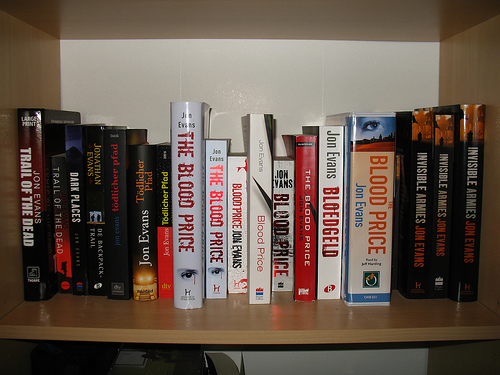So this is awkward. Ownshelf is a new service that lets people store and share ebooks online. Pretty nifty, huh? They reached out to me in part because I’ve released several of my own books for free under a Creative Commons license. (For those of you new to this column, I write fiction when not writing code, and have had a bunch of novels published by HarperCollins, Hachette, etc., over the years; see picture.) What they didn’t know is that for fun, all by my lonesome, I recently created — and open-sourced — a service called ePubHost which, er, lets people store, search, and share quotes from their ebooks online. Sound familiar? Um.
But despite the existence of mine own open-source competitor, I think Ownshelf is on to something. It was shopkeepers, not miners, who got rich from gold rushes. Similarly, in a world where self-publishing is so easy, creating an ebook platform sounds like a much better economic strategy than actually writing a book.
The problem with the latter is a fundamental mismatch of supply and demand. The world is full of would-be authors. (It is alleged that many centuries ago, lamenting the endless decline of civilization, Cicero complained, “Children no longer listen to their parents, and every man wants to write a book.”) But there are already an awful lot of books out there. And many of them are very good.
The average American reads only 17 books a year. (Others say it’s a mere 6.5, but let’s be optimistic.) Call it 1,200 books per lifetime. If every author on the planet fell down dead tomorrow, there would still be far too many good books out there — heck, too many great books — for most people to get through before they died.
I can’t see that books-per-year number drastically increasing any time soon, given the shinier distractions everywhere we turn these days. Meanwhile, the supply of books just keeps growing, and growing, and growing–it seems that tens of thousands of new novels are published every year. So, Economics 101: when supply skyrockets, and demand stagnates, what happens to price?
Obviously I’m being quite reductive here; obviously books are not fungible, and different people have different tastes and interests, and many books grow stale and fail to appeal to modern minds; and yet, the general problem remains. No matter what mélange of literary niches floats your particular boat, you probably have too many good books to read and not enough time. And more books emerge every year. Of course, there are more readers, too, but that’s only slightly relevant. The per-person demand remains the same. 17 books per year. 1,200 per lifetime.
Despite that, I for one will keep writing, even though I know that I’m competing with Gabriel García Márquez, Margaret Atwood, Martin Cruz Smith, Jo Walton, George R.R. Martin, Hilary Mantel, and Cormac McCarthy, to name a few personal modern favorites — and also with the self-published masses, some of whom are probably superb. Not least because I’m arrogant and weird enough to believe that a couple of mine own books (in particular, believe it or not, the one about a squirrel) deserve to be among those 1,200.
But I don’t think there’s any point in trying to write anything merely good any more. The world is overflowing with good. Storytellers today must either go great or go home.
And I’m not just talking about books. When Michael Arrington interviewed Mark Zuckerberg at TC Disrupt earlier this year, there were nearly 30 different TV cameras there, all of them capturing pretty much exactly the same shot. Literally thousands of journalists attend the Olympics. Wouldn’t the world do just fine with only five or six of those cameras, and merely hundreds of Olympic journalists? Isn’t that, in all likelihood, the world towards which we are moving?
Newspapers everywhere are moving towards paywalls, but even if they profit today, they’ll only prolong their agony. The endgame is a world in which most publications will specialize in one particular genre: tech, business, entertainment, sports, international, local. Only a few will span many genres. Newspapers as we know them will mostly be reduced to the “local” genre, at which point a paywall will hurt more than help. But they face the same problem as authors: there’s an overwhelming supply of news, features, and analysis out there, versus a limited and probably maxed-out demand from each member of the audience.
Thanks to today’s tech it has never been easier to create and publish music, movies, books, journalism, or indeed, virtually any other form of self-expression. Thanks to tomorrow’s tech, it’s going to get easier yet. Lots of people love to create, or at least aspire to it. Creators are widely admired and revered in our society. (I really don’t fully understand why, though of course I do appreciate it.) But there is only so much time in which to consume all these glorious creations that beset us on every side. So I beg of all you would-be writers, musicians, directors, and journalists out there: as Laurence Olivier once said of acting, “If anything can stop you — let it.”
Image credit: Slightly obsolete vanity shelf, by yours truly, on Flickr.
(Disclaimer 1: I should probably declare my paywall affiliation: My employer HappyFunCorp numbers a paywall provider among its clients, and I’ve written a bunch of code for them over the last year-plus.)
(Disclaimer 2: I, too, am technically a self-publisher — now that the rights for the pictured novels have reverted from their original publishers to me, I have Kindle-published them myself.)






























Comment